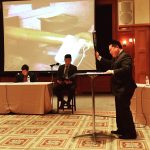“Is that the bat you used to kill Vincent Chin?” intoned government attorney Theodore Merritt (played by Brooklyn Law School student Jimmy Kang) during his direct examination of Ronald Ebens (played by Brooklyn Law School student Brian Kim), in the trial reenactment of the Vincent Chin case that took place on February 21 at the Forchelli Center at Brooklyn Law School. (Click on the photo above for more photos from the reenactment.)
Presented by the Brooklyn Law School APALSA and the Brooklyn Law Students for the Public Interest, “Building Our Legacy: The Murder of Vincent Chin” brought together law students, faculty and alumni in the reenactment of a seminal time and event in Asian American history. The program took us back to the early 1980s, when a young Chinese American man, Vincent Chin, was brutally beaten to death outside of Detroit after an argument in a strip club while out with friends for his bachelor party. The assailants were white, out-of-work auto workers who accused Vincent of being a “Jap” that took away their jobs. The men were allowed to enter into a plea bargain that kept them out of jail and subjected them to a $3000 fine. The light sentence resulted in outrage and led to protests from the emerging Asian American community. The reenactment recounts the Federal trial that followed and raises disturbing and still-pertinent questions about race, social justice and hate crimes.
Dean Nicholas Allard and Professor Frank Wu served as the narrators of the reenactment. Professor Wu co-authored the script with the Hon. Denny Chin. The Vincent Chin reenactment has been the most performed of any of the AABANY Trial Reenactments.
After the riveting performance, Professor Wu joined Corky Lee in a panel discussion about the historical context of the Vincent Chin case and its enduring legacy. AABANY Issues Committee Co-Chair Chris Kwok served as moderator. Corky also brought several of his photos from the Vincent Chin protests to display at the event.
This year marks the 35th anniversary of Vincent Chin’s murder. Any notion that this kind of crime is confined to the past was shattered on February 22 – the day after the reenactment – with the reports of the shootings in Olathe, Kansas, of two South Asian patrons at a neighborhood bar by a white patron who hurled racial slurs against them, demanding that they return to their own country. Srinivas Kuchibohtla was killed and his friend Alok Madasani was wounded, along with Ian Grillot, a fellow patron who tried to intervene.
The Asian American Bar Association of Kansas City released a statement condemning the attacks and urging
all law enforcement, authorities, and Mr. Steve Howe, District Attorney for Johnson County, Kansas, to prosecute this crime at the highest level. While mindsets are not changed overnight, the prosecution of this crime as a hate crime by the U.S. Department of Justice would serve as a strong statement that hateful, racist, and xenophobic actions such as this will be met with the full force of the law.
Part of the injustice of the Vincent Chin case was that hate crimes statutes did not exist at that time under which the government could prosecute his murderers. We hope that the law and the times have changed over the course of the past three decades to ensure that justice is done in the Olathe, Kansas shooting.
In the meantime, the legacy of Vincent Chin compels us to continue confronting the question of whether we will ever learn the lessons of history. Only time will tell.


